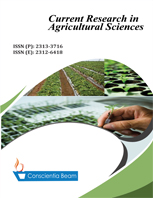Genetic Divergence and Character Association of Kabuli-Type Chickpea (Cicer Arietium) Genotype under Rainfed Conditions in Ethiopia
DOI:
https://doi.org/10.18488/journal.68/2015.2.4/68.4.123.131Abstract
Chickpea is the major pulses grown in Ethiopia, mainly by subsistence farmers usually under rain-fed conditions Variability, heritability and correlation are the backbone of every selection method. The objective of the present study was to assess genotypic variability, heritability and correlation of 17kabuli-type genotypes for yield and yield related traits under rainfed condition. The experiments were conducted at the field area of Akaki, Chefe donssa, Deber zeit, Dembia and Haramay under RCB Design with four replication including 17 diverse genotypes of chickpea. There were significant genetic differences between genotypes for all the characters studied which suggested enormous scope of genotypes selection with desirable characters. High heritability for seed per pod, 100 seed weight and pod per plant high genetic advance revealed that additive gene effects were important in determining these traits. High heritability with low genetic advance for days to flowering and seed per pod indicated influence of dominant and epistatic genes. Estimation of correlation coefficients showed that pods per plant, plant biomass, plant height, and harvest index and 100-grain weight were positively correlated with grain yield. The traits, which revealed high amount of heritability and genetic advance, were controlled by additive genes, which advocated the chances of their improvement through selection. In the present investigation high to low heritability with moderate estimates of genetic advance recorded for pod per plant, seed per pod, plant height days to flowering, days to maturity,100 seed weight and grain yield where careful selection may lead towards improvement for these traits. Hence, provides better opportunities for selecting plant material for these traits in chickpea.

